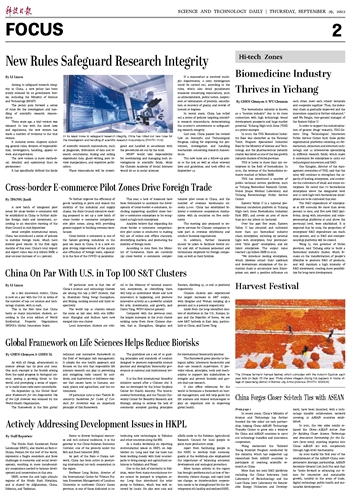
 New Rules Safeguard Research Integrity
New Rules Safeguard Research Integrity Biomedicine Industry Thrives in Yichang
Biomedicine Industry Thrives in Yichang Cross-border E-commerce Pilot Zones Drive Foreign Trade
Cross-border E-commerce Pilot Zones Drive Foreign Trade China On Par With U.S. in Top 100 S&T Clusters
China On Par With U.S. in Top 100 S&T Clusters Global Framework on Life Sciences Helps Reduce Biorisks
Global Framework on Life Sciences Helps Reduce Biorisks China Forges Closer Sci-tech Ties with ASEAN
China Forges Closer Sci-tech Ties with ASEAN Actively Addressing Development Issues in HKPL
Actively Addressing Development Issues in HKPL Harvest Festival
Harvest Festival
As with all things, advancement in science always has its pros and cons. One such example is the biorisk arising from the rapid progress in biological science, posing a growing threat to the world, and prompting a sense of urgency to make these risks more controllable.
On September 13, the Global Guidance Framework for the Responsible Use of the Life Sciences was released by the World Health Organization.
The framework is the first global technical and normative framework in the field of biological risk management. It adopts the one health approach and focuses on the role that responsible life sciences research can play in preventing and mitigating risks caused by accidents, and inadvertent or deliberate misuse that causes harm to humans, animals, plants and agriculture, and the environment.
Of particular note is that Tianjin Biosecurity Guidelines for Codes of Conduct for Scientists was an important principle of this framework.
The guidelines are a set of 10 guiding principles and standards of conduct designed to promote responsible science practice and strengthen biosecurity governance at national and institutional levels.
It is the first international biosafety initiative named after a Chinese city. It was co-developed by the Johns Hopkins Center for Health Security, The InterAcademy Partnership, and the Tianjin University Center for Biosafety Research and Strategy, aiming to address the lack of commonly accepted guiding principles for international biosecurity practice.
The framework gives priority to biological safety, laboratory biosecurity and dual-use research supervision. It provides values, principles, tools and mechanisms to support key stakeholders to mitigate and prevent biorisks and govern dual-use research.
It also offers references for the world to formulate a framework on biorisk management, and will help guide the life sciences and related technologies to play an important role in improving global health.


 Next
Next



